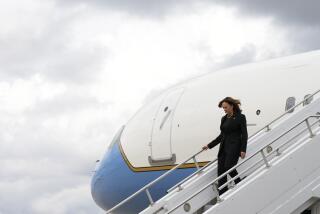Clinton Relative Had Proposed She Head Travel Office : Firings: Distant kin wrote memo in February. White House announces that the Little Rock agency has been replaced by American Express.
- Share via
WASHINGTON — For the third day in a row, Clinton Administration officials found themselves on the defensive Friday over the firing of seven workers in the White House travel office--an incident that is fast becoming a metaphor for the political clumsiness and sour press relations that recently have dogged the President’s team.
The latest round in the story involves a memo written last February by Catherine Cornelius, a White House staffer who had arranged travel bookings for the Clinton presidential campaign. Cornelius, a distant relative of Clinton--her great-grandmother was his great-grandfather’s sister--now works in the travel office. In the memo, Cornelius criticized the existing travel office as “overly pro-press” and suggested, essentially, that she be put in charge along with the travel agency that handled air charters for the Clinton campaign, Worldwide Travel of Little Rock, Ark.
Clinton spokesman George Stephanopoulos insisted that the White House official to whom the document was addressed, David Watkins, the head of administrative affairs, never read Cornelius’ memo and that the memo had no connection to Watkins’ decision, several months later, to fire the seven travel office employees.
But White House reporters responded with disbelief, noting that although Cornelius did not get exactly the job she wanted--she is not in charge--she did get a job in the new office and Worldwide Travel had, after all, been asked to handle charters for the White House until a firm could be chosen by competitive bidding.
That arrangement turned out to be even more temporary than White House officials had planned, however. Late Friday, the White House, stung by the brouhaha, announced that the connection with Worldwide had been severed, and that American Express Travel had been retained in its place.
But that move came too late. Reporters already had seized on the Cornelius memo as evidence that the White House had planned the firings long before an audit discovered the sloppy bookkeeping and other management errors that officials later cited as reasons for the dismissals. In addition, reporters noted the overall anti-press tone of Cornelius’ writing, linking the comments to other incidents in which White House aides have seemed hostile to the press corps.
“I can completely disavow the attitude in the memo,” Stephanopoulos said.
Clinton, asked about the flap, defended his aides. “The decision was made based on striving for efficiency,” he said during a White House photo session.
But amid all the questions, Republicans saw an opening. Senate Minority Leader Bob Dole of Kansas attacked the White House handling of the issue, citing “real perception problems . . . and, possibly, real sleaze.” And Sen. Christopher S. Bond (R-Mo.), demanded a congressional investigation.
White House officials tried to shoot back Friday afternoon, issuing a copy of the audit report from KPMG Peat Marwick that documented “lack of financial control” and sloppy accounting at the office. Officials also released a statement from the FBI, repeating what White House aides had said earlier in the week--that bureau investigators had found “sufficient information for the FBI to determine that additional criminal investigation is warranted.”
But the audit and the FBI statement were essentially attempts at damage control. Neither document added any new information to a story that has become a raging obsession for the White House press corps. On Friday, the number of reporters and photographers cramming into the White House briefing room for the daily press briefing roughly doubled the usual attendance and, as has been true for the last several days, questions about the travel office dominated the briefing.
Ironically, White House aides originally thought the firings would be a positive story--demonstrating they were being aggressive in cleaning up management inefficiencies. But they forgot two basic rules of political operation: first, make sure your own house is clean, and second, be careful in going after people who are friends of the press.
Although no one has yet found any proof of wrongdoing on the part of the White House, the fact that Cornelius is a relative of Clinton’s, albeit distant, the fact that some travel office business was contracted out to Worldwide, albeit temporarily, and the fact that longtime Clinton friend Harry Thomason was involved, albeit to an unclear extent, all have combined to create a huge problem of appearances for the White House.
One of the factors that started the examination of the travel office was complaints relayed by Thomason that charter companies he knew of had not been allowed to bid for White House business.
Thomason, a Hollywood producer, has insisted to friends that he did nothing improper. But Administration officials are continuing to look into the question of whether he may have used his friendship with the President to seek business for friends.
The appearance problem was worsened because the fired men worked in a job whose sole purpose is the care and feeding of the White House press corps. Each of the fired men has done innumerable favors for reporters over the years. And if, as White House officials have suggested, they overbilled the press in the process, reporters were quick to admit they did not care since the money involved was not theirs, but their employers’.
“Who cares about the money, they took good care of us,” said one reporter. “They took the only seven people in the government I trust and fired them,” said another.
The problem has been made still worse by the way the story dribbled out, with White House officials caught repeatedly offering unsupported, and in some cases conflicting, accounts of exactly what happened and why.
More to Read
Sign up for Essential California
The most important California stories and recommendations in your inbox every morning.
You may occasionally receive promotional content from the Los Angeles Times.











